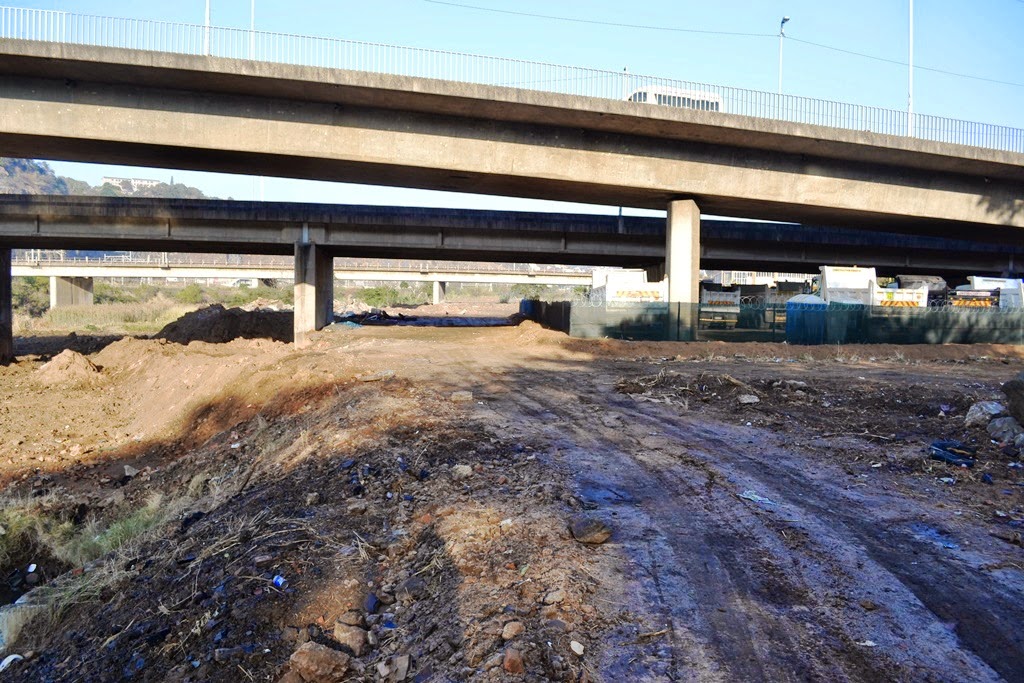29 June 2014 | look-and-see-walk uMngeni Estuary Durban
I am always amazed when I go down to the river at how much
there is to see and experience. On
Sunday 29 June a group of us met at 8 o’clock at the uMngeni River Bird Park http://www.umgeniriverbirdpark.co.za/ for a
look-and-see walk along the uMngeni Estuary.
We were met by a few members and two young Nature Conservation students
Musa Zikhali and Maphiwe Ndlovu . First
we saw a fish eagle high up in the dead blue-gum, then a goliath heron on
the mud flats. We moved across to the
construction site under Connaught Bridge.
Here the river is being widened so that the Springfield Business Park
does not get flooded. It is hoped that
the widening will ultimately also contribute to a more accessible pathway along
the river. We looked at the trash boom
which prevents litter from the storm water drains entering the river and ultimately
the Indian Ocean.
We posed for a photograph at the beginning of the Fish Eagle
Trail. Actually the Trail has been known
as the Umgeni Park River Trail. However
we like the name Fish Eagle Trail far more.
The name reminds us that we are indeed fortunate to have fish eagles
still fishing in our Estuary.
The back of the DUCT http://www.duct.org.za/ T-shirt reads HLONIPHA. This means respect in IsiZulu.
We walked along the Trail oblivious of the traffic on
Riverside Road. The riparian zone and
Trail was actually reasonably tidy and clean. I avoided a clump of Lagoon Hibiscus’ where I
knew from my walk the previous Saturday that the prostitutes had been pretty
busy. We had visitors and young members
from Westville and I felt uncomfortable with the display of litter in these
bushes. So we walked on to the giant Ficus lutea. This magnificent tree survived the 1986
floods and its roots show how roots bind the soil. We talked about the huge Dwyka-tillite boulders, 300 million years old, and which remind us of the glacial period of Earth’s formation. We then walked through the tunnel of branches
formed by the Hibiscus tilliaceus.
At the bottom of Brown’s Drift we stopped and chatted about
the many homeless people who live on the river.
A recent traumatic event has scarred the community. A well respected policeman from Greenwood
Park police station was shot dead at the Athlone Mews complex when he
investigated a robbery in progress. This
has made the community particularly suspicious of any vagrant activity. The estuarine perimeter is a green open space
and accessible to anyone and everyone.
At one point we came across a man having a bath in a stream
flowing into the estuary from the storm water drains at Prospect Hall. I asked Emanuel to go ahead and warn him that
we were approaching. He had a strange
suitcase and covered himself with an interesting police type jacket. I later learnt that he had told people in the
area that he was one of Mugabe’s bodyguards.
He said he had been beaten up and could no longer be in Zimbabwe.
We stood on the M4 bridge above the Beachwood Mangroves
looking eastwards at the river. We were
lucky a large group of at least 14 pelicans started fishing. We could see the schools of fish trying to
get away. The pelicans did not seem to
be such good fishermen. Then the entire
group flew across the bridge and over to the western side where they were no
longer visible to us. We looked at the
woolly necked storks, a heron, a Pygmy Kingfisher and the encroaching White Mangroves
and some Black Mangrove trees.
We turned and started our walk back to the bird park. Roland was distracted in trying to identify
whether the tiny fishes in the stream were guppies or actually tadpoles.
We traversed the cycling and walking Trail and identified
some of the trees that had been planted many years ago. A fruiting Ficus we thought to be a Sandpaper Fig, umdubu womfula, caught our interest.
We stopped to look at the Cordia caffra or ulovulovu tree in IsiZulu. These tree labels need to be renewed.
Our next outing will be a social event in the Beachwood Mangroves
on 20 July, so please join us with family and friends and prospective members.
Margaret Burger
Margaret Burger
















Great content! If you’re unemployed or changing careers, check out jobsindurban.com for current job vacancies in Durban, work opportunities in KwaZulu-Natal, and Durban employment listings. The website is well organized and easy to navigate.
ReplyDeletejob vacancies in durban